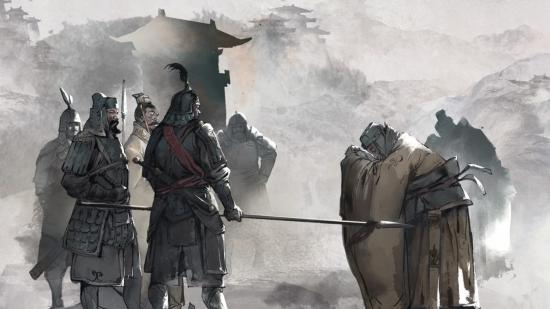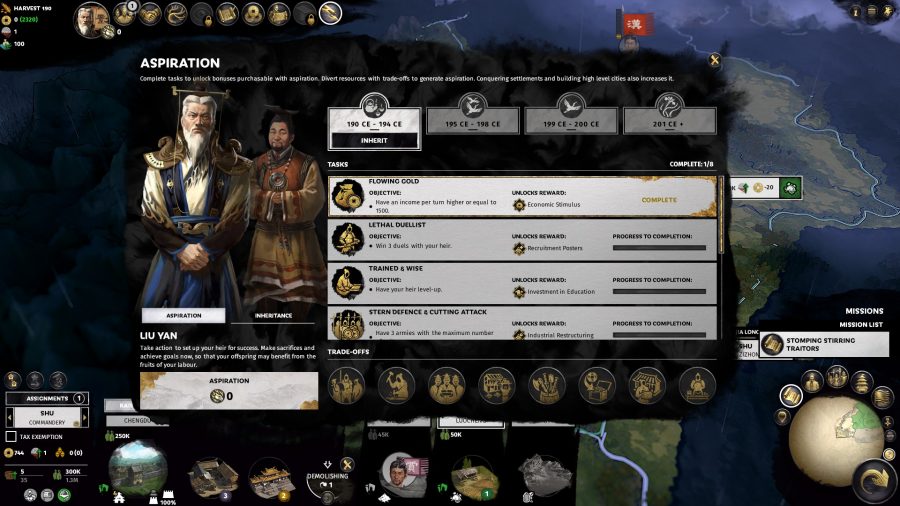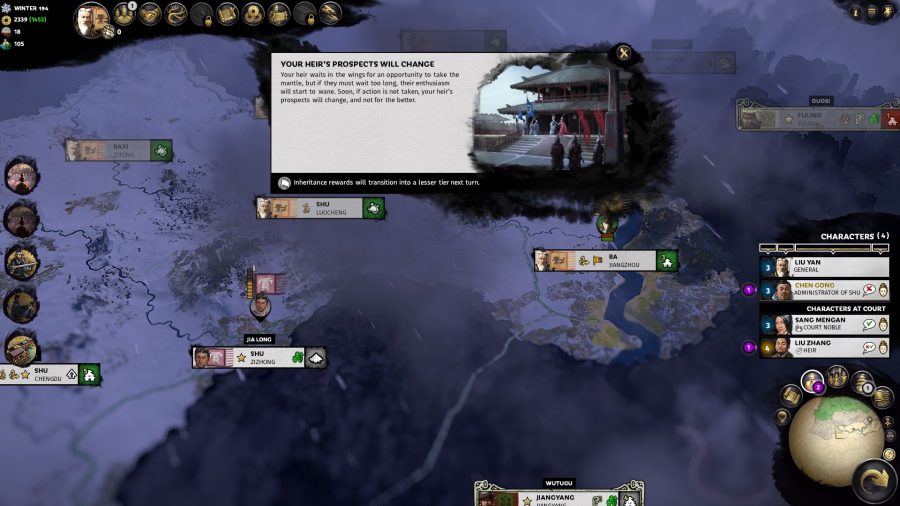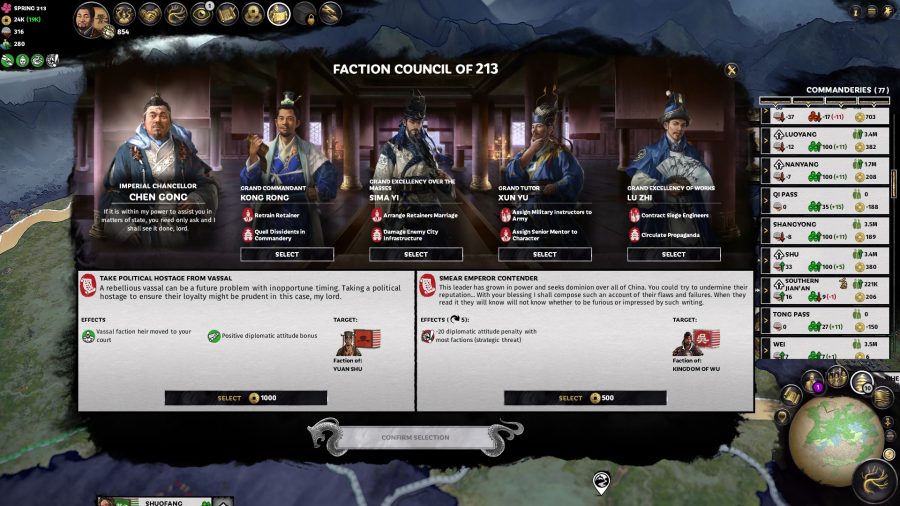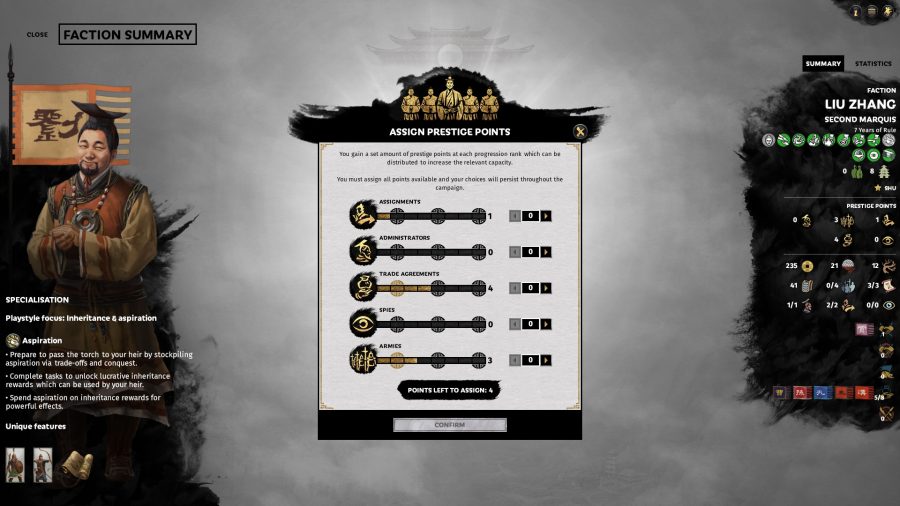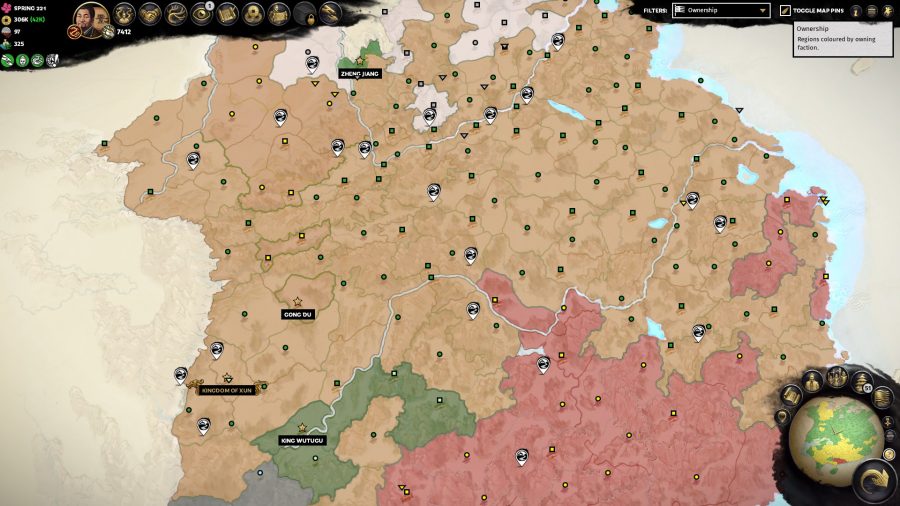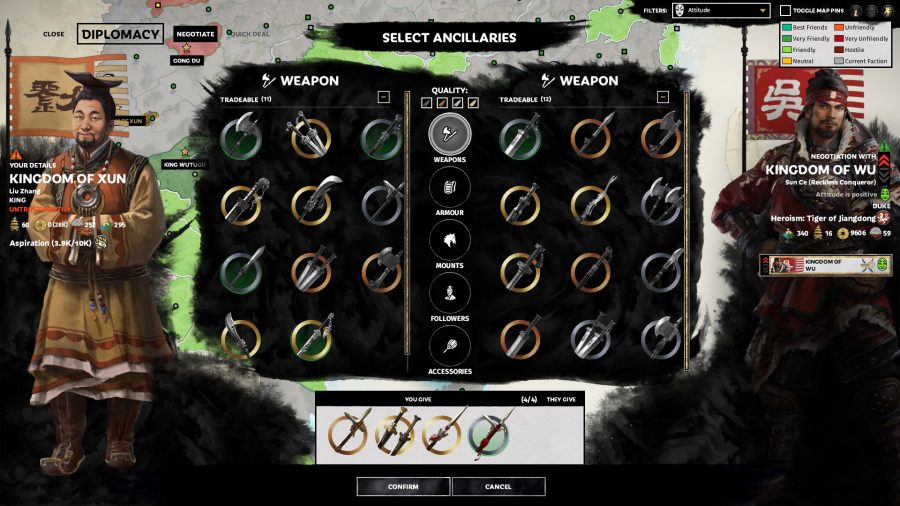Total War games are not supposed to be played peacefully. It’s right there in the name. Though many other large-scale strategy games offer non-violent victory conditions or playstyles, this series has always been about crushing opponents in the theatre of war. But Three Kingdoms is a slightly different creature.
Ever since the game launched a couple of years ago, players have been trying – and sometimes even succeeding – to play pacifist campaigns. They’re possible for the first time in the series thanks to an overhauled and much-deepened diplomacy system, and Liu Bei’s Unity mechanic is handy for forging peaceful confederations, providing a further boon. Nevertheless, pacifist campaigns remain very difficult.
But hope is here for all proponents of peace. Three Kingdoms’ next expansion Fates Divided, and the hefty update that rolls in with it, give aspiring emperors a suite of new tools to solve problems without poking them with a spear. And we’re going to put them to the test.
First, the ground rules. To do this properly, I decide to be very strict in my approach to pacifism: I am not allowed to muster any armies, declare war, or even use spies (I know myself, and I would be too tempted to assassinate people. I’ve been informed this isn’t very pacifist.) Instead, I’ll rely on a strong economy to purchase settlements, and use the game’s new tools to trick, bargain, and manipulate my way out of any hostilities.

And who better to start my campaign with than Liu Zhang, the proponent of peace himself? He and his father Liu Yan arrive in Fates Divided as the first-ever cross-generational campaign. The ‘Inheritance’ mechanic allows Liu Yan to complete missions that unlock special buffs which Liu Zhang can activate when he takes the reins, varying from free ancillaries to income boosts. Craig Kirby, senior designer on Three Kingdoms, provides some context for these new features:
“Total War is a sandbox experience, so we’re primarily focused on providing a set of tools with a historical context. In the new update we’ve greatly expanded the available mechanics to the player – more customisation via the progression feature, more powerful unique characters, and more cunning shenanigans. I think the key enabler is that a player has so many new ways to interact with other factions, and most of them don’t involve sending in the troops.”
Liu Zhang is powerful, to be sure. Not only does he have Inheritance, but he buffs faction food production by 50%, which is extremely useful considering Three Kingdoms’ AI factions usually have too much money and never enough food.
But first thing’s first: I jump into the game at 190CE with Liu Yan and immediately encounter his hostile neighbour, Jia Long. He’s one of Total War’s customary pushover factions – a weak starting enemy whose territory is yours to take. Provided you can fight him. As a pacifist I’m obliged to seek an end to a war I could easily win – and after I begrudgingly give him all my stuff, we become firm friends.
Still reeling from having made peace with the ‘here’s a free kill’ faction, I spend the next twenty turns or so completing as many Inheritance missions as I can. I purchase a few settlements from the failing Han Empire, appease the angry Nanman on my southern border with food, and stay out of the way of warlords like Gong Du. You can choose when to let Liu Zhang take over, but the longer you wait the more antsy he gets for the big chair, causing your inheritance rewards to weaken. The ideal date is 194, so the time you spend playing Liu Yan can be fairly short.
I pass the mantle at the opportune time and embrace my mission to become China’s bread basket. I sell my food surplus to rich factions, but also give it away to smaller ones, leading to smiley faces all over my diplomacy screen. Since Three Kingdoms’ diplomacy system counts each resource to a value limit of 15 in any deal, food and all my extra ancillaries are vital in purchasing settlements, and immediately suing for peace if anyone feels the need to declare war. It’s also around this time that I convene my first faction council.
Many of you may remember the faction council as that thing where your court characters give you the same missions over and over, but the rework has made it into a powerful tool. Need a skilled character? Send out some feelers. Is a settlement’s public order low? Quell the dissidents. Is a character unhappy? Laud them as a hero. The faction council isn’t just a get-out-of-trouble free card once per year, but a dynamic box of options, adapting each councillor’s proffered choices to whatever ails you.
“In the [Romance of the Three Kingdoms] novel, pivotal war-changing moments are often guerrilla actions performed by a single person. The faction council is designed to show that each faction is more than just a leader and their armies,” explains Kirby. “The AI eagerly uses the feature too – not just on the player, but also on other AI factions. All the council shenanigans are geared around making the world feel more alive – and more combative – outside the battlefield.”
I can certainly attest to AI using the feature, considering the number of looter armies the Kingdom of Wu sent my way later in the game. The faction council is reminiscent of Civ’s World Congress in that it shines brightest when navigating the mature world state of the endgame. Need options against a big player? You can lower their diplomatic standing, send out third-party raiders against them, or reduce the satisfaction of their characters, giving you a potential spy to boot. It’s perfect for pacifists who aren’t above a little skulduggery.
But being a good boy, I do none of this as I continue my peaceful progress towards the Mandate of Heaven. I rank up to become a marquis and then a duke, and in the new progression screen, I assign prestige points between various logistical capacities: trade agreements, administrators, assignments, armies, and spies. It’s another tool that will benefit all players, enabling you to further customise your playstyle, but it’s a particular boon for my pacifist campaign. I max out trade agreements and administrators, neglecting armies entirely.
The new Imperial Intrigue feature also comes into play, granting me bonuses based on my level of imperial favour if I’m ever in a tight spot. Luckily, most of the missions that grant favour involve giving food to other Han factions, and as I may have mentioned, food is kind of my thing.
I continue to purchase settlements, gather vassals, and fiddle with all the levers available to me to solve problems I’d normally handle with violence. Besides obliging you simply to explore every diplomatic option, it also fosters a fittingly diplomatic mindset: normally Total War diplomacy is about stripping weaker factions of all they’re worth, but needing them to like you necessitates offering favourable deals, and sometimes even just being plain philanthropic. As Kirby explains, cultivating this varied approach is what continues to make Three Kingdoms special:
For the lowdown: Check out the best Total War games
“Some players like to turtle up until they’ve maxed out tech, and then explode out of the gates. Other players like to try and win as quickly as possible, or even by forcing AI vassals to fight all battles for them. I’m happy as long as the player’s having fun. Three Kingdoms intentionally enables more diplomatic shenanigans than previous Total War games. Sometimes wars are won with a big climactic battle, but other times they’re resolved in a quiet council chamber behind closed doors.”
All of this said, playing Liu Zhang’s Fates Divided campaign as a pacifist may have been the easiest Three Kingdoms playthrough I’ve ever had. I grow quickly thanks to his powerful character buffs, and forestall any problems before they get out of hand through the faction council. Confederation also lets me bring a majority of the game’s best characters and ancillaries into my faction. It’s all going swimmingly… until I reach the Three Kingdoms period.
Cao Cao and Liao Biao are the final factions to fall, presumably tired of suffocating under the endless mountains of food I’m sending them. In a weird turn of events, Zheng Jiang and Gong Du also became part of my empire – nothing says ‘peace’ more than uniting with bandits and Yellow Turbans. I even manage to get the Kingdom of Wu to join my empire after I give them every ancillary I own – which is a lot, having stripped them from all the factions I’ve confederated.
But no matter what I do, I can’t get the Kingdom of Yan to capitulate. Beyond a certain point, buying settlements stops being viable. The other kingdoms also despise you for being a strategic threat, so even if you do shower them with gifts, it’s like getting blood from a stone. Ultimately, I guess there’s only so much peace to be had in Total War.
Playing a pacifist campaign will always be about trying to game Total War, but I do think it’s a fascinating way of examining the depth of Three Kingdoms’ diplomacy system in a vacuum. The fact that I was able to become the second-to-last free faction in the game, and by far the biggest, without mustering a single army is not only a testament to how deep Three Kingdoms’ diplomacy continues to be, but also how much the rework adds to what’s already there.
Related: We break down the Total War: Warhammer 3 trailer
“My favourite component of the new update is how it impacts all campaigns, no matter who the player chooses to play as,” says Kirby. “Our previous chapter packs have focused on a specific flashpoint – such as Lu Bu’s story or the Yellow Turban Rebellion – but Fates Divided impacts all chapter packs. Imperial Intrigue is gonna kick into 190 CE campaigns when Emperor Xian comes of age in 197 CE. Cao Cao and Yuan Shao can use their features in all chapters, and Liu Yan and Liu Zhang get to take part in multiple start dates.
“Everything we’ve learned supporting the game post-release is pouring back into the original content, and we’re bringing fan-favourite characters up to the level we set in A World Betrayed.”
